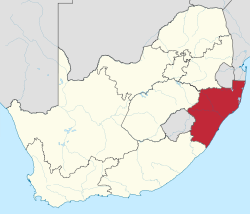
Back KwaZulu-Natal Afrikaans كوازولو ناتال Arabic KwaZulu-Natal AST Kvazulu-Natal vilayəti Azerbaijani Квазулу-Натал (правінцыя) Byelorussian Квазулу-Натал BE-X-OLD Квазулу-Натал Bulgarian KwaZulu-Natal Breton KwaZulu-Natal Catalan Province of KwaZulu-Natal CEB
KwaZulu-Natal
iKwaZulu-Natali | |
|---|---|
| Province of KwaZulu-Natal | |
| Nickname: The Garden Province | |
Mottoes:
| |
 Location of KwaZulu-Natal in South Africa | |
| Country | |
| Province | 27 April 1994 |
| Capital | Pietermaritzburg |
| Largest city | Durban |
| Districts | |
| Government | |
| • Type | Parliamentary constitutional monarchy[1] |
| • King | Misuzulu |
| • Premier | Thami Ntuli (IFP) |
| • Legislature | KwaZulu-Natal Legislature |
| Area [2]: 9 | |
• Total | 94,361 km2 (36,433 sq mi) |
| • Rank | 7th in South Africa |
| Highest elevation | 3,451 m (11,322 ft) |
| Lowest elevation | 0 m (0 ft) |
| Population (2022)[3] | |
• Total | 12,818,479 |
| • Rank | 2nd in South Africa |
| • Density | 132/km2 (340/sq mi) |
| • Rank | 2nd in South Africa |
| Demonym | Natalian |
| Population groups (2022) | |
| • Black | 84.8% |
| • Indian or Asian | 9.3% |
| • White | 4.1% |
| • Coloured | 1.5% |
| • Other | 0.3% |
| Languages (2022) | |
| • Zulu | 80.0% |
| • English | 14.4% |
| • Xhosa | 3.1% |
| • Afrikaans | 1.0% |
| Time zone | UTC+2 (SAST) |
| ISO 3166 code | ZA-KZN |
| HDI (2019) | 0.706[4] high · 5th of 9 |
| GDP | US$64.7 billion[5] |
| Website | www |
| Zulu | iKwaZulu-Natali |
|---|---|
| Xhosa | iKwaZulu-Natala |
| Afrikaans | KwaZoeloe-Natal |
| Xitsonga | KaZulu-Natali |
KwaZulu-Natal (/kwɑːˌzuːluː nəˈtɑːl/, also referred to as KZN; nicknamed "the garden province")[6] is a province of South Africa that was created in 1994 when the government merged the Zulu bantustan of KwaZulu ("Place of the Zulu" in Zulu) and Natal Province.
It is located in the southeast of the country, with a long shoreline on the Indian Ocean. It shares borders with three other provinces and the countries of Mozambique, Eswatini and Lesotho. Its capital is Pietermaritzburg, and its largest city is Durban, which is also the city with the largest port in sub-saharan Africa. It is the second-most populous province in South Africa, after Gauteng.
Two areas in KwaZulu-Natal have been declared UNESCO World Heritage Sites: the iSimangaliso Wetland Park and the uKhahlamba Drakensberg Park. These areas are extremely scenic as well as important to the surrounding ecosystems.
During the 1830s and early 1840s, the northern part of what is now KwaZulu-Natal was established as the Zulu Kingdom. The southern part was, briefly, the Boer Natalia Republic before the British took over control in 1843, renaming it as the Colony of Natal in 1843. The Zulu Kingdom remained independent until 1879.
KwaZulu-Natal is the birthplace of many notable figures in South Africa's history, such as Albert Luthuli, the first non-white and the first person from outside Europe and the Americas to be awarded the Nobel Peace Prize (1960); Pixley ka Isaka Seme, the founder of the African National Congress (ANC) and South Africa's first black lawyer; John Langalibalele Dube, the ANC's founding president; Harry Gwala, ANC member and anti-apartheid activist; Mac Maharaj, Grammy award-winning group Ladysmith Black Mambazo, Grammy award-winning DJ Black Coffee, ANC member, anti-apartheid activist and Little Rivonia Trial defendant; Mangosuthu Buthelezi, the founder of the Inkatha Freedom Party (IFP); Anton Lembede, the founding president of the ANC Youth League; Jacob Zuma, the former President of South Africa; Bhambatha, a 19th-century Zulu chief who became an anti-apartheid icon; and Shaka Zulu.
- ^ KwaZulu-Natal Traditional Leadership and Governance Act, 2005 (PDF) (Act). KwaZulu-Natal Legislature. 2005. Section 17. Retrieved 26 October 2024.
- ^ Census 2011: Census in brief (PDF). Pretoria: Statistics South Africa. 2012. ISBN 9780621413885.
- ^ a b c "Statistical Release - Census 2022" (PDF). statssa.gov.za. Retrieved 22 August 2024.
- ^ "Sub-national HDI - Area Database - Global Data Lab". hdi.globaldatalab.org. Retrieved 13 September 2018.
- ^ "Provincial gross domestic product:experimental estimates, 2013–2022" (PDF), www.statssa.gov.za
- ^ "KwaZulu-Natal province, South Africa". Archived from the original on 24 July 2014. Retrieved 10 April 2014.
